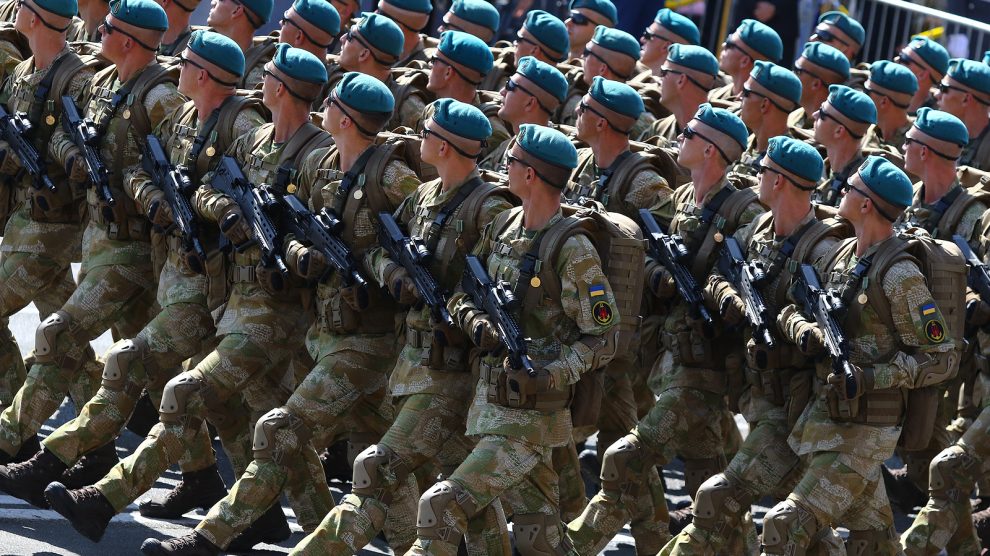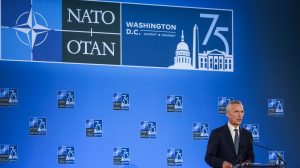Catch up quickly with the stories from Central and Eastern Europe that matter.
Russia’s war on Ukraine
Ukraine’s military wants to mobilise up to 500,000 extra people, President Volodymyr Zelensky said on Tuesday, as the war with Russia nears a two-year mark.
At a news conference in Kyiv, he said his commanders were seeking “450,000-500,000 individuals”, admitting this was a “sensitive” and costly issue. He said he needed more details before backing the move, hinting that 500,000 soldiers were already on the front.
On Thursday, Defence Minister Rustem Umerov said that Ukrainian men between the ages of 25 and 60 living abroad will be asked to report for military service.
The European Union can bypass Hungary’s opposition to joint aid for Ukraine by striking a separate deal among the 26 other member states at a summit early next year, Prime Minister Viktor Orbán said on Thursday.
The bloc has been looking for ways to get around Hungary’s intransigence after talks over a 50 billion euros package for the government in Kyiv broke down at a summit last week.
A potential back-up option that has been floated is having member states funnel money to Kyiv outside of the EU budget process, an option Orbán signalled may be viable.
“It’s not a question that Hungary’s will can be circumvented in many areas,” the premier told reporters in Budapest. “The others have that opportunity in this area as well.”
Ukraine’s spies aim to intensify intelligence operations and conduct sabotage strikes deep in Russian-controlled territory next year to bring the war as close to the Kremlin as possible, the head of Ukraine’s SBU security service told Politico this week.
“We cannot disclose our plans. They should remain a shocker for the enemy. We prepare surprises,” Major General Vasyl Malyuk said in written responses to questions. “The occupiers must understand that it will not be possible to hide. We will find the enemy everywhere.”
While he dodged specifics, Malyuk did give some hints. Logistics targets and military assets in occupied Ukrainian territory are likely to continue to be a focus. And then there are strikes that hit the enemy across the border.
“We are always looking for new solutions. So, cotton will continue to burn,” Malyuk joked.
Ukrainians use the word “cotton” to describe explosions in Russia and the occupied territories of Ukraine organised by Ukrainian special services.
Ukrainian lawmakers on Thursday approved in a second and final reading a bill to legalise medical marijuana.
The bill would create a national medical marijuana program to provide access to patients with conditions such as cancer or post-traumatic stress disorder (PTSD) resulting from war. The National Security and Defence Council and the Veterans Ministry have supported the move. The legislation will take effect in six months.
Other news from the region
A gunman killed 14 people and seriously wounded 11 others at a Prague university on Thursday before being “eliminated”, according to police and Prague emergency services. Czech police said shortly after 3pm that they were responding to the shooting at Charles University’s faculty of arts building in Jan Palach Square, before reporting the shooter had been “eliminated”. The Prague emergency services department said on social platform X that 14 people had been killed including the gunman and 11 were seriously wounded.
Serbia’s snap election last Sunday was marred by irregularities, media bias and the misuse of state resources that skewed the race in favour of President Aleksandar Vučić’s ruling party, according to European observers. The president’s Progressive party won an outright majority in the 250-seat parliament and prevailed in a parallel race for the Belgrade city assembly. Hundreds of people demonstrated against alleged voter fraud in the Serbian capital of Belgrade on Monday and Tuesday, following calls by the main opposition camp to protest the results.
Polish state TV channel TVP Info was taken off air on Wednesday after PM Donald Tusk’s new government moved to depoliticise public media. Parliament in Warsaw backed a resolution on Tuesday calling for independence, objectivity and pluralism in public TV and radio. The new culture minister dismissed the heads of TVP and Polish Radio. MPs from the Law and Justice (PiS) party who lost power in October reacted by staging a sit-in at TVP HQ. PiS condemned the Tusk government’s “illegal actions”, and President Andrzej Duda accused it of “violating constitutional principles and the law”.
Slovakia’s streets were again sites of protest on Tuesday, with thousands of people mobilising to oppose plans by populist Prime Minister Robert Fico’s new government to amend the country’s penal code. The prospective changes, which will require parliamentary and presidential approval, include a proposal to abolish the special prosecutor’s office, which handles serious crimes such as graft, organised crime and extremism. According to the plans, from mid-January these cases would be taken over by prosecutors in regional offices, which haven’t dealt with such crimes for 20 years.
Azerbaijan sees no major obstacles to securing a lasting peace treaty with its neighbour Armenia and believes the question of defining their borders can be resolved separately, a senior Azerbaijani official said on Tuesday. Azerbaijani President Ilham Aliyev’s forces mounted a lightning offensive in September to retake control of Azerbaijan’s Karabakh region, whose ethnic Armenian population had broken away in a war in the 1990s. “The 35-year-long conflict is now over,” Hikmet Hajiyev, a top foreign policy adviser to Aliyev, told reporters in London.
The European Commission, Lithuania, Latvia, Estonia, and Poland on Tuesday signed a political declaration on the synchronisation of the Baltic states’ electricity grids with Western Europe by February 2025. According to European Commissioner for Energy Kadri Simson, synchronisation will allow the Baltic states to take full control of their electricity networks, integrate into the European market, and strengthen the region’s energy security. The EU has allocated more than 1.2 billion euros over the last 12 years to synchronise the Baltic electricity networks with those of continental Europe.
Remittance flows to Europe and Central Asia are estimated to have declined by 1.4 per cent to 78 billion US dollars in 2023, according to the World Bank. The subdued growth in 2023 is due mainly to an unusually high base level posted in 2022, driven by huge amounts of money transfers from Russia, and a lingering weakness in flows to Russia and Ukraine. Depreciation of the Russian ruble against the US dollar has also decreased the value of money transfers from Russia. In 2024, remittances are projected to post a decline of 1.2 per cent.
Albania’s parliament voted on Thursday to lift the legal immunity of former Prime Minister Sali Berisha, who leads the opposition Democratic party and is accused of corruption. Opposition lawmakers inside the hall boycotted the vote and tried to disrupt the session by collecting chairs and flares, but security guards stopped them. Berisha declined to take the floor to speak against the motion. Berisha, 79, was charged with corruption in October for allegedly abusing his post to help his son-in-law, Jamarber Malltezi, buy land in Tirana.
A boarding school building partially collapsed in central Romania on Monday, leaving one person dead and three injured, authorities said. Emergency workers raced to find the four people under the rubble in the town of Odorheiu Secuiesc in Harghita county, according to the General Inspectorate for Emergency Situations. Authorities said the four trapped by the collapse were brought out but one did not survive. “The fourth victim did not respond to resuscitation efforts,” they said. There was no indication as to what caused the collapse.
Unlike many news and information platforms, Emerging Europe is free to read, and always will be. There is no paywall here. We are independent, not affiliated with nor representing any political party or business organisation. We want the very best for emerging Europe, nothing more, nothing less. Your support will help us continue to spread the word about this amazing region.
You can contribute here. Thank you.







Add Comment